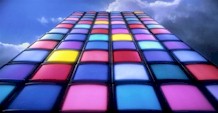


| SYNOPSIS: In many areas of contemporary life, virtual reality has already supplanted the more literal kind. |
An emblematically odd moment in contemporary life occurred when the Midwestern cornfield used in the filming of the movie Field of Dreams found itself transformed into a regional tourist attraction.
It's not unusual for people on vacation to want to visit famous places, or to have their pictures taken there. But traditionally, these locations have had real-world significance and history: the Acropolis, St. Peter’s, the British Houses of Parliament, and so forth. The Field of Dreams cornfield has nothing at all notable about it, beyond having been used in a work of cinematic fiction (actually, a fiction about a fantasy).
When I learned of this cornfield’s peculiar celebrity, I began wondering whether all the excited talk we were beginning to hear in those days from the techno-gurus about an impending new era of virtual reality might not actually be beside the point. Maybe we were already living in virtual reality.
It also occurred to me that I needed to reconsider what defines virtual reality. My thoughts ran along the following lines:
Virtual reality is commonly spoken of in terms of computer technology creating environments in which we become immersed—sometimes with the aid of special eyepieces, joysticks, gloves, or other paraphernalia. None of these features, though, truly distinguish virtual reality from the more literal kind. Real soldiers can wear special high-tech headsets to see things at night that are not, in the strictest sense, visible; yet their adversaries end up quite empirically and literally dead. Likewise, joysticks and computer simulations could be used to position real-world satellites, and doctors might perform real-world microsurgery by means of "virtual" gloves.
The defining element for virtual reality seems to be not so much the technology itself, as the purpose and manner in which it is used. In essence, virtual reality appears to be the use of manufactured perceptions to supplant natural or spontaneous perceptions of what is actually going on around us.
Under this definition, I realized—more than a quarter of a century ago—that much of modern life might be considered a virtual reality experience.


